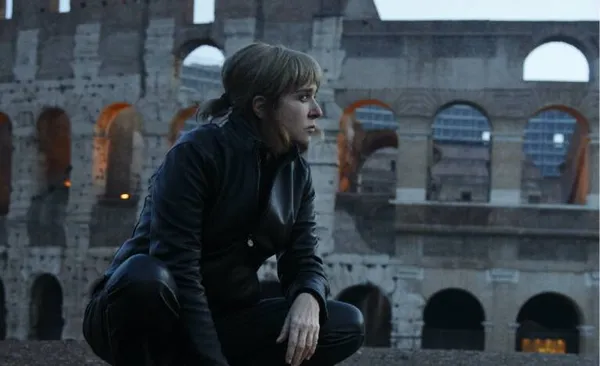Eye For Film >> Movies >> Blue Eyes (2021) Film Review
Blue Eyes
Reviewed by: Andrew Robertson

Blue Eyes might be a heist movie or a policier, a revenge fable or an exercise in aesthetic sensibility. There's enough of each that it is perhaps all of them. What's certain though is that within the varicoloured hues of a neo-noir it manages a tone of almost effortless cool that recalls other highlights of genre.
Michela Cescon's début feature, Blue Eyes is an assured piece of film-making. Co-writing with Heidrun Schleef (The Son's Room, among many others) and polymath and occasional novelist Marco Lodoli, the film's episodic nature feels less televisual than literary.

Split into un-numbered chapters separated by title cards, the tale is at least at surface a simple one. There is a thief, a daylight robber, who strikes at will across Rome escaping on a scooter. The thrill of the chase is there.
Except, and one of the film's many striking decisions, it isn't. A crime thriller predicated upon a series of daring escapes that scarcely shows us them. It is enough, instead, to know that they exist. To see the preparations, the aftermath. The need for speed? Other films will sate that. We are given something cooler.
Il Segreto, Il Piacere, L'Intuzione, L'Incontro, L'accordo, La Fuga, Il Regalo. In the subtitles these are given definite articles, but I think that weakens them. Seven in total, translated as (The) secret, (the) pleasure, (the) intuition, (the) alliance [sic], (the) escape, (the) gift. Stronger slightly different. Sets of seven of course, when we're in Rome: seven sins, seven virtues, seven hills, seven chapters.
The Secret. We know, as the audience, and quickly. Valeria, played by veteran actress Valeria Golino. We meet her mechanic, hot-headed Marco (Matteo Olivetti). We will see her planning. We will see her on a high powered motorcycle in a basement garage in moments that recall Walter Hill's The Driver. We will know much, and also little, about her. We know the secret.
Pleasure. We receive, as an audience, and quickly. From a first shot from above snaking along the Tiber, a sweep to reveal the red of traffic lights, the intermittent blue of silent sirens. Andrea Farri's score leaning into trumpet solos and electronic stutters. The trumpet might be, like the palette, muted. Matteo Cocco's camerawork catching everything that a wide variety of locations have to offer. On several spiral staircases a hypnotic heft to it all, a vertiginous weave of verticality that brings a different smile than blurred corridors and polished leather. Sweeps and curves of orange plastic and blue chalk, laminated wood and precision perspex. The road. Tiles.
Intuition. In desparation, resignation, the police turn to "the Frenchman". He has, ostensibly, retired, but he is back. On the hunt. He has an idea. Ivano De Matteo may be better known as a director, but here he is a hangdog pursuer. The quantity of locations and the quality of their depiction is important, not least as Il Francese starts to find himself in the same places as his quarry. The story travels as smoothly as on rails, though one scene of contemplated transparencies feels like Bladerunner through a hall of mirrors. A future made of a future made of a past the past thought looked like a present yet to be.
Understanding. That's a better translation of "L'accordo". Not only an agreement, an alignment, a matching of wavelengths. We've seen down the same sushi belt conveyor. We've seen the sweep of the hands of an Omega Coaxial Chronometer. We've seen the blank face of the helmet. The underworlds and the interzones, the liminal and the subliminal. A synchronicity within the cynical metropolis. There's an expository phonecall that feels a little laboured. A moment in a café where no coffee is consumed but a coyote is observed. A flashback of sorts to three faces that adds a clumsy lack of mystery when earlier certainty had been drained away. Nonetheless, a clarity of purpose made clear.
Escape. 'Fuga', though, means more than that. Flight, not the winged kind. Fugue in the sense of dreaming. Breakaway and sprint in the parlances of sport. Leak, even. The similar seaming 'fugazi' meaning 'fake' isn't from Italian but the French 'fougasse', something explosive. It gives little away to say the ending here is not. Powerful, but not brightly so. Can't have neo-noir without a fresh spin on darkness.
Gift. Blue Eyes is. At 86 minutes it absolutely whips along, but still finds time for dozens of moments of genuine beauty. Actinic headlights, muzzles and tailcoats, piano bars filled by mournful commissioners. "big cities are all the same" and they lay their patterns everywhere. A curve made serrated by light through Venetian blinds, steamed windows, cameras that are fixed at speed and that slowly drift. A moment of confusion that someone is described as an 'employee' rather than the similarly encoded but more specific 'clerk'. A scene at the end that is at once unnecessary and deeply rooted, an appendix in at least two senses. There's architecture that could well be an Italianate Moderne, from somewhere in the last 60 years of the Sixties.
Blue Eyes is too, belonging in a tradition that includes figures like Hill, Mann, impishly it is a car chase film that includes neither, much like the similarly stylish Drive. It stands instead to be found in a different way, and is well worth looking for. It isn't perfect, but even for want of a little correction it is a film disciplined and taut, stylish, stunning, eye-catching.
Reviewed on: 27 May 2022
















